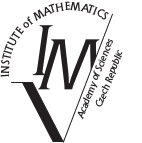Tutorial Track
C. Conley: Treeable equivalence relations
An equivalence relation is treeable if it is the connectedness relation of an acyclic graph (subject to various definability constraints). This is a surprisingly robust class of equivalence relations, which nevertheless captures sees much of the complexity of the Borel reducibility hierarchy. After collecting various properties, we survey Hjorth's construction of a continuum of incomparable treeable countable Borel equivalence relations, and also investigate methods of establishing treeability.
V. Fischer: Combinatorial Sets of Reals
In these tutorial lectures, we will consider recent advances in the study of the so called combinatorial sets of reals, i.e. sets which are usually associated the combinatorial cardinal characteristics of the continuum. Of particular interest for us will be their spectra, i.e. possible cardinalities, their projective complexity, as well as their higher Baire spaces analogues. The study of those sets is closely accompanied by the development of new forcing techniques, or significant advancements of already existing ones, on which we will comment (to a various degree) throughout the lectures.
slides I, slides II, slides IIIA. Kwiatkowska: Compact connected spaces via the projective Fraisse limit constructions
We discuss the projective Fraisse limit construction introduced by Irwin and Solecki. They applied it to give a new construction of the pseudo-arc and to show projective homogeneity and universality results of that space. Irwin and Solecki obtained the pseudo-arc as the topological realization of the projective Fraisse limit of the family of finite linear graphs.
Since then a number of continua (compact connected spaces) or more generally compact spaces were obtained using the projective Fraisse limit construction or its variants, and their homeomorphism groups were studied. Examples include: the Lelek fan, the Menger curve, the universal Knaster continuum or the Poulsen simplex. Moreover, continua unknown before were discovered using these methods. In the series of talks I will give an overview on the current state of the art on this topic.
slides I, slides II, slides IIIA. Rinot: Club-Guessing
In Part I, we shall present the basic club-guessing principle $CG(S)$, and prove that it holds for $S:=E^\kappa_\theta$ (the set of all ordinals below $\kappa$ of cofinality $\theta$) provided that $\theta<\kappa$ are regular uncountable cardinals and $\theta^+<\kappa$. An ad-hoc treatment of the case $\theta=\aleph_0$ will be given, and raising the concept of Relative club-guessing. We shall also present postprocessing functions, and compare Ulam matrices with a coloring obtained by Sirepinski under a GCH-type assumption, motivating an application of club-guessing that will appear in the second lecture.
In Part II, we shall construct an optimal Sirepinski-type coloring in ZFC, using pcf scales and club-guessing. We then move on to address the extreme case of $CG(E^\kappa_\theta)$ where $\kappa=\theta^+$. This inevitably leads to the introduction of the Idealized guessing principle $CG(S,\vec J)$, which in turn requires the study of Amenable $C$-sequences and nonconservative postprocessing functions. As an application, we waive an uncountability assumption from the first lecture, proving that $CG(E^\kappa_\theta)$ holds for every pair $\theta<\kappa$ of infinite regular cardinals such that $\theta^+<\kappa$.
In Part III, we combine idealized club-guessing with relative guessing, resulting in the principle $CG(S,T,\vec J)$. We explain how Partitioned club-guessing can compensate for the inevitable shift to idealized $CG$. We show how anti-large-cardinal hypotheses on $\theta$ or on $\kappa$ imply that a given witness to $CG(E^\kappa_\theta,T,\vec J)$ may be partitioned, and examine the impact of the sequence of ideals $\vec J$ on one's ability to partition. This leads to a Solovay-type decomposition theorem for club-guessing and to a general discussion on how to move from $CG(S,T,\vec J)$ to $CG(S',T',\vec{J'})$. Combining all the acquired machinery, we conclude that for every cardinal $\lambda\ge\beth_\omega$ such that $\square(\lambda^+)$ holds, $CG(S,T,\langle J^{\text{bd}}[\delta]\mid \delta\in S\rangle)$ holds for all stationary subsets $S,T$ of $\lambda^+$.
slides I, slides II, slides III
